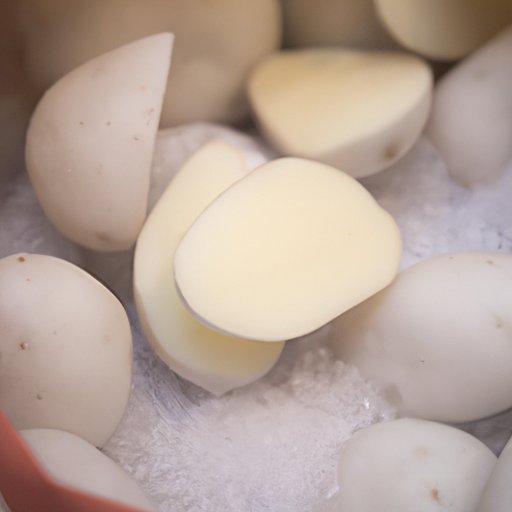
Introduction
We’ve all done it – added a little too much salt to our favorite dish. It’s a frustrating and disappointing feeling when the taste of your meal is ruined because it’s over salted. But don’t worry, there are ways to save your meal from becoming inedible. In this article, we’ll explore the science behind over salting, methods for fixing an over salted dish, and provide strategies for preventing this cooking mistake in the first place.
The Science Behind Over Salting: How Much Salt Is Too Much, And What To Do When You’ve Crossed The Line
According to the American Heart Association, the recommended daily intake of salt is 2,300 mg per day for an adult. However, most of us consume much more than that. When we add too much salt to our food, the taste becomes overbearing and the texture of the food can become tough or mushy, depending on the dish.
To prevent over salting in the future, it’s important to start with the recommended amount of seasoning and taste as you go along. Adding a little bit at a time, and tasting regularly, will help avoid the mistake of over salting.
5 Tried-and-True Methods for Saving an Over Salted Dish
If you’ve already gone overboard, don’t worry! There are many ways to fix an over salted dish. Here are five tried-and-true methods:
Diluting Method
The easiest way to reduce the saltiness of a dish is to dilute it. Add more of the non-salty ingredients to the dish, such as unsalted broth, water, or cooked rice.
Lemon or Lime Juice Method
An acid, such as lemon or lime juice, can help counteract the taste of salt. Add small amounts at a time, and taste as you go. You can also add vinegar for this purpose.
Sugar or Honey Method
Adding sweetness to a dish can also help mask the saltiness. Sugar, honey, or maple syrup can work well in savory dishes.
Potato Method
Adding a peeled raw potato (or chopped) to the over-salted dish helps to absorb the salt. Cook the dish for around 15 to 20 minutes, remove the potato pieces and season to taste.
Bread Method
Bread absorbs salt similar to potatoes. A white bread slice placed on top of the food sucks the salt into it. Cook at a low temperature as it crispy.
While each method can be effective, the best option depends on the dish and personal preference. For example, the lemon or lime juice method may not work well for a creamy pasta sauce, while the potato method may be ineffective in a salad.
From Soup to Stir Fry: Simple Fixes for Over Salted Foods
Here are some specific examples of how to fix common dishes that are often over salted:
Soups and Stews
The best way to save an over salted soup or stew is to dilute it. Add more water or broth, and taste as you go. If the soup becomes too thin, then add additional ingredients such as chopped vegetables, cooked pasta, or cooked beans to maintain the soup’s texture.
Pasta Dishes
If you’ve added too much salt to your pasta water, try diluting the salt by adding unsalted boiling water. If the pasta itself is over salted, adding a small amount of butter or olive oil to the drained pasta while hot, and then seasoning to taste, can help camouflage the salt.
Stir Fry
For an over salted stir fry, dilute it by adding more vegetables or broth, or by sautéing extra vegetables on the side without any seasoning and then mixing them in with the over salted stir fry. Alternatively, if the stir fry sauce has too much salt, then add some honey or sugar to balance the flavors.
When Life Gives You Salty Lemons: Overcoming the Heartbreak of Over Salting
It’s perfectly normal to feel frustrated or disappointed when you’ve over salted a dish, but try not to lose heart. Cooking is all about learning from mistakes, and even experienced chefs make errors. It’s important to keep trying, and use each mistake as an opportunity to learn and grow as a cook.
Emergency Easy Fixes for Overly Salty Soups, Stews and Sauces
Here are a few quick fixes that can help rescue an over salted soups, stews, or sauces in case of emergencies:
Add Water Method
Add water to the soup, stew or sauce until you get the desired taste.
Add Potatoes Method
Add raw potatoes to the dish to absorb the salt in the same way as mentioned in the diluting method above. Once the potatoes have cooked for about 15 minutes, it can be removed and thrown away.
Add Milk Method
Add milk or cream to dairy-based soups and sauces to help neutralize the saltiness. Do this slowly, taste as you go.
Cooking Mistakes 101: Over Salting and How to Fix It
Over salting is just one of many common cooking mistakes. Whether you’ve burned the bottoms of your cookies or accidentally added too much garlic to your pasta sauce, know that every chef has made mistakes. Don’t let a cooking error discourage you from continuing to experiment in the kitchen.
Bringing Balance Back: Strategies for Salvaging Over Salted Meals
Fixing an over salted meal is all about restoring balance to the dish. Whether you’re using the dilution method or the lemon juice method, remember to adjust seasoning gradually and to taste often to get the desired results. At the end of the day, cooking is all about trial and error, and experimenting with different combinations and techniques.
Conclusion
Over salting your favorite meal can be frustrating, but it doesn’t have to ruin the dish. With the methods and tips included in this article, you can save your meal and learn from your mistake. Remember, cooking is all about learning and adapting.




